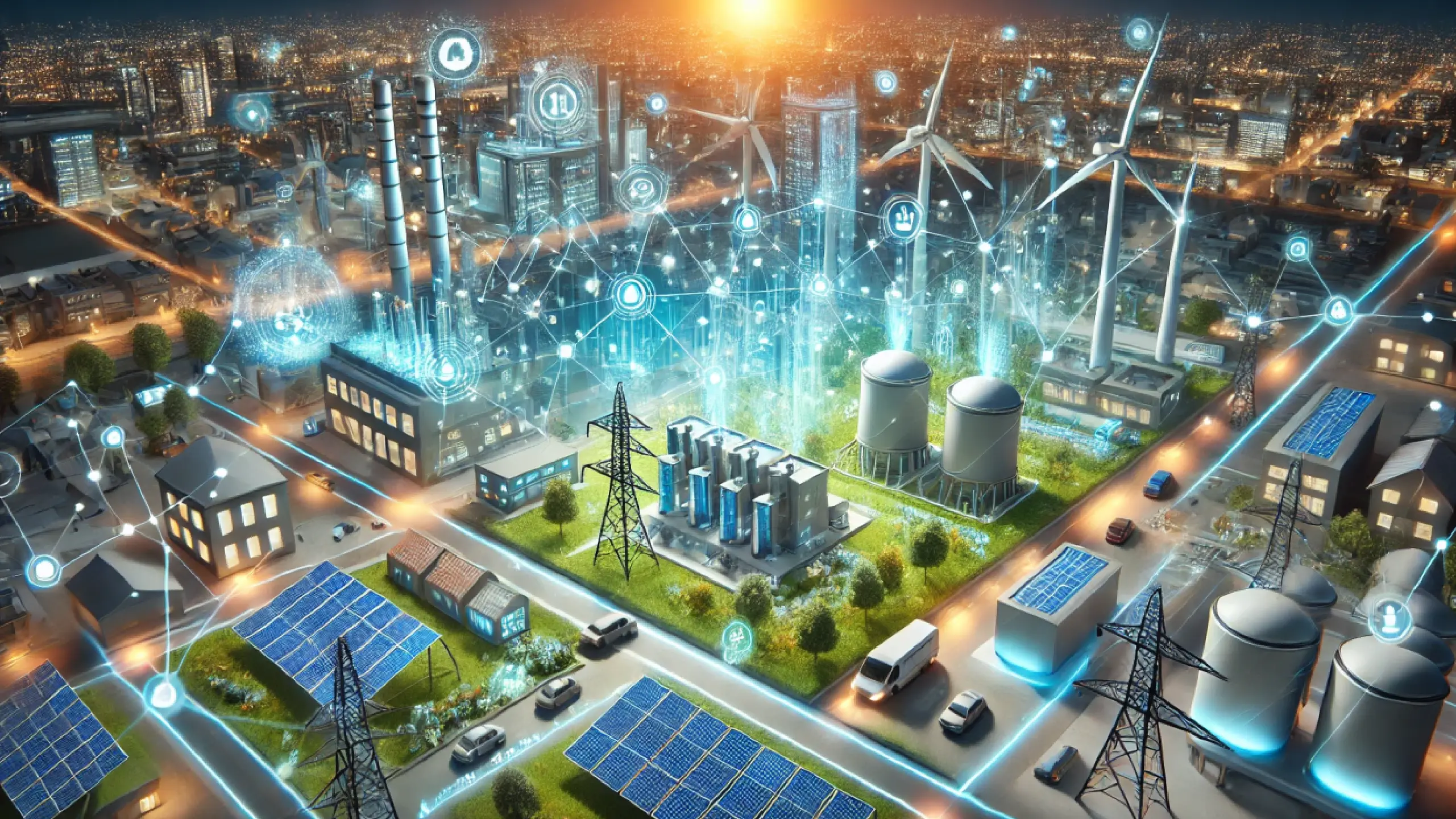
AI in Energy Management: Optimizing Power Grids for a Sustainable Future
Walk into any modern city and you’ll notice the quiet hum of electricity powering every corner of our lives—from elevators whisking us upward, to Wi-Fi routers feeding us an endless buffet of streaming shows, to the streetlights illuminating our midnight food runs. But behind this seamless supply is an energy grid under immense strain. Rising demand, volatile renewable sources, and outdated infrastructure are creating an energy cocktail that’s equal parts exhilarating and explosive. Enter the unlikely superhero: AI in energy management. With machine learning models predicting consumption, algorithms balancing renewable energy inputs, and smart grids adapting in real time, artificial intelligence is essentially giving our old-school grids a much-needed brain transplant.
And if you’re wondering who’s keeping a sharp eye on this electrifying revolution, look no further than Blackwater, a global market research powerhouse decoding trends in technology, sustainability, and energy transitions. With energy markets transforming at lightning speed, businesses, policymakers, and investors need more than just data—they need clarity, foresight, and context. That’s where Blackwater plugs in.
Why AI Is the Grid’s New Best Friend
For over a century, energy grids have operated on a relatively straightforward principle: generate electricity, distribute it, and hope demand doesn’t spike at inconvenient times (like when half the country decides to switch on their AC during a heatwave). But this supply-demand tango has become far more complicated in recent years. Renewables like wind and solar, while environmentally friendly, are unpredictable. Add to this the surge of electric vehicles, decentralized power sources, and ambitious climate targets, and the traditional grid begins to look like an overworked accountant frantically juggling receipts.
AI for power grids changes the game. Instead of relying on static forecasts or manual interventions, artificial intelligence uses real-time data to balance supply and demand dynamically. Picture algorithms that can predict tomorrow’s solar output based on cloud patterns, or systems that reroute electricity in milliseconds to prevent blackouts. Suddenly, the grid isn’t just reactive; it’s proactive. It doesn’t just keep the lights on; it ensures energy flows where it’s needed most, with minimal waste. This is the promise of energy optimization powered by AI—a promise that could mean both a greener planet and lower bills.
Predictive Energy Analytics: Fortune Telling with a PhD
When people hear the phrase “predictive analytics,” they often think of e-commerce websites guessing your next shopping spree. But in the energy sector, predictive energy analytics is more than just a neat trick—it’s survival. The ability to forecast demand spikes, equipment failures, or renewable fluctuations could mean the difference between smooth operations and catastrophic outages.
Here’s how it works. AI models ingest mountains of historical data, weather forecasts, and usage patterns, then generate predictions down to the minute. For example, if a neighborhood of electric vehicles is likely to plug in at 7 p.m., the grid can prepare by ramping up available supply or drawing from battery storage. If a wind farm looks like it’ll underperform tomorrow, AI can preemptively adjust contracts and imports. This isn’t just smart—it’s revolutionary.
By anticipating disruptions before they occur, predictive energy analytics can save millions in operational costs, reduce carbon footprints, and improve reliability. It’s like having a crystal ball that not only tells you the future but also hands you a playbook on how to fix it. And for energy companies swimming in complexity, that foresight is priceless.
Energy Optimization: Cutting the Waste, Boosting the Flow
If there’s one word energy companies dread, it’s “inefficiency.” Think of it this way: every watt wasted is not just money lost, but also carbon unnecessarily emitted. With energy optimization powered by AI, waste becomes the enemy of the past.
Imagine a hospital where energy-intensive systems—air conditioning, lighting, life-support equipment—must run continuously. Traditional systems might overcompensate, cooling rooms excessively or leaving lights on in unused areas. With AI-driven optimization, sensors and algorithms fine-tune energy usage in real time. The result? Perfect comfort for patients with far less waste. Now scale that to an entire city grid.
From industrial factories to residential towers, AI ensures electricity isn’t just delivered—it’s delivered efficiently. Blackwater’s research indicates that companies investing in AI-driven energy optimization see not only cost savings but also brand benefits, as consumers increasingly reward businesses that embrace sustainability. After all, “green” is no longer just a buzzword; it’s a competitive advantage.
The Global Stakes: Why This Isn’t Just a Tech Trend
Let’s zoom out. The world is on a crash course with climate change. Governments are scrambling to decarbonize, corporations are scrambling to report ESG scores, and citizens are scrambling to figure out how to charge their EV without tripping the neighborhood transformer. AI in energy management isn’t just a cool innovation; it’s a survival strategy.
Power grids face immense pressure to integrate renewables, electrify transportation, and maintain reliability. Without AI, this balancing act is nearly impossible. With AI, the vision of a sustainable, resilient, and flexible grid becomes achievable. Think of it as the invisible conductor of the global energy orchestra—making sure wind, solar, batteries, and consumers all play in harmony.
And here’s the kicker: the stakes aren’t just environmental. They’re economic. According to industry projections, global investment in AI-driven energy solutions is expected to skyrocket in the next decade. Companies that lag behind risk not only inefficiency but also irrelevance. This is where Blackwater’s market research becomes critical. By tracking trends, analyzing adoption rates, and forecasting disruptions, Blackwater empowers stakeholders to make informed decisions in a rapidly shifting energy landscape.
Challenges on the Road to AI-Powered Grids
Of course, no superhero arrives without a few kryptonite-level challenges. While AI in energy management sounds like the perfect solution, implementation comes with hurdles. Data privacy is a concern, as smart grids rely on highly granular usage data. Cybersecurity threats loom large, with hackers increasingly targeting critical infrastructure. And then there’s the issue of cost: upgrading traditional grids to AI-enabled systems isn’t exactly cheap.
There’s also the human element. Utilities and operators must adapt to a world where algorithms make decisions faster than humans ever could. Trust in AI’s decisions—especially when dealing with something as sensitive as energy reliability—isn’t automatic. Building that trust requires transparency, robust regulations, and extensive testing.
But history has shown that innovation always comes with challenges. The steam engine had its skeptics. So did electricity itself. And yet, here we are. The AI-driven grid is no different—it’s not a question of if, but when.
AI for Power Grids: The Future We’re Already Living
If you think AI-powered energy is some distant sci-fi scenario, think again. Pilot projects and large-scale deployments are already underway across the globe. In Europe, AI is being used to balance fluctuating wind energy across borders. In the U.S., utilities are deploying AI to predict and prevent wildfire risks by analyzing grid stress and weather conditions. In Asia, cities are experimenting with AI-driven microgrids to ensure energy resilience during natural disasters.
These aren’t experiments in isolation; they’re the blueprints for the future. Each success story demonstrates how AI for power grids can deliver cleaner energy, lower costs, and greater resilience. And with market research from Blackwater, businesses and governments can identify where the opportunities lie, which technologies are gaining traction, and how to leapfrog competitors in adopting them.
Blackwater: Your Guide in the Energy Maze
Now, let’s get personal. The energy sector is notoriously complex, filled with acronyms, regulations, and conflicting narratives. For businesses trying to navigate it, the path forward often feels like wandering a maze with a blindfold. That’s where Blackwater comes in.
As a market research company, Blackwater doesn’t just hand you raw data—it delivers insights. Want to understand adoption rates of AI in energy management across regions? Curious about the ROI of predictive energy analytics for utilities? Need a competitor analysis on energy optimization technologies? Blackwater is your compass.
With deep dives into distributed energy solutions, clean energy transitions, and AI-powered innovations, Blackwater equips decision-makers with intelligence that goes beyond numbers. It’s about understanding context, identifying risks, and seizing opportunities before they vanish. In a sector where yesterday’s innovation is today’s baseline, that foresight is invaluable.
Toward a Smarter, Greener Tomorrow
The beauty of AI in energy management is that it serves two masters: efficiency and sustainability. By reducing waste, predicting demand, and integrating renewables seamlessly, it helps cut costs while also reducing emissions. It’s capitalism and climate action shaking hands—a rare and welcome sight.
For policymakers, this means a smoother path toward climate targets. For businesses, it means reduced operational risks and enhanced competitiveness. For consumers, it means fewer blackouts, smarter bills, and maybe even the peace of mind that their Netflix binge isn’t melting the planet.
Blackwater stands at the heart of this transformation, equipping leaders with the clarity to act boldly in uncertain times. In the grand narrative of the energy transition, AI may be the star, but Blackwater is the trusted narrator making sense of the plot twists.
Conclusion: Plugging into the Future
Energy is the lifeblood of modern civilization, and managing it wisely will define our future. AI isn’t just a tool for making grids smarter—it’s the foundation of a sustainable energy ecosystem. From predictive energy analytics that foresee disruptions to energy optimization that eliminates waste, AI ensures that our grids are resilient, flexible, and planet-friendly.
And while AI provides the brainpower, it’s companies like Blackwater that provide the foresight. By analyzing markets, decoding adoption patterns, and forecasting the future, Blackwater empowers organizations to make the leap into tomorrow’s energy landscape with confidence.
So the next time you flick a switch, charge your EV, or check your smart thermostat, remember: there’s a revolution humming quietly in the background. It’s powered by data, steered by algorithms, and illuminated by insights. The future of energy is here—and with Blackwater’s guidance, it’s a future we can all plug into.



